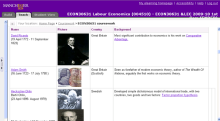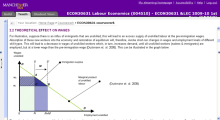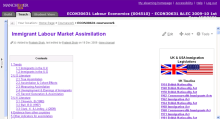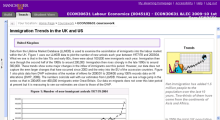Ken Clark
University of Manchester Published January 2011
Introduction
This case study concerns the use of a wiki as a vehicle for collaborative learning in a third year optional module at the University of Manchester. Inspired by the increasing use of Web 2.0 technology in a variety of contexts, the wiki was used to facilitate a group-based assessment which contributed one third of the final module mark. The essential idea of Web 2.0 - that the internet, is not just a repository of information but a platform on which geographically-distributed peers can collaborate and share ideas - is, arguably, well suited to the modus operandi of university teaching and the production of knowledge in the classroom. In what follows I describe how the wiki was implemented and evaluate its use with reference to feedback from students as well as the experience of the instructor.
The concept of a wiki, an internet-based store of information which can be edited as well as browsed by members of a defined group, has become increasingly well-known in recent years. This is largely a result of the popularity of Wikipedia, the free online encyclopaedia, which can, in principle, be edited by anyone with an internet connection. Wikipedia’s influence on how people search for information has led Cummings (2008) to claim that, “Wikipedia has fundamentally and finally altered epistemology itself” (p. 2). Similarly, Tapscott and Williams (2007) in their best-seller Wikinomics argue that the widespread use of wikis is changing the process of knowledge creation in industry and commerce as well as the academy. Tapscott and Williams (2010) opine that universities have been relatively slow to grasp the potential of wikis and that traditional models of pedagogy are increasingly unsuitable for a digital world. “Universities are losing their grip on higher learning as the Internet is, inexorably, becoming the dominant infrastructure for knowledge—both as a container and as a global platform for knowledge exchange between people” (Tapscott and Williams, 2010, p. 18).
Two particular aspects of wikis make them well suited to the facilitation of a group-based project in a university module. First, wikis are inherently “open” – each potential contributor has the opportunity to express their interpretation of the topic in question and to change the content to reflect this. Secondly, wikis are inherently “collaborative” – the ultimate outcome is the product of a process of (online) engagement between individuals who may be geographically distributed, yet who can discuss, edit and refine each other’s work and ideas. Such openness and collaboration ought to be values at the heart of all academic activity, including teaching, and are desiderata of knowledge creation in the university classroom. Creating a wiki can also be thought of as a form of “social learning” and there is evidence to suggest that learners who form groups are more effective than those who work on their own (Seely Brown and Adler, 2008). Furthermore, the link has been drawn between the activities inherent in creating a wiki and the idea of learning within a “community of practice” (Gilbert et al., 2008).
Description of the Project
The project involved the creation of an assessment activity based on the production, by students, of a wiki. This formed one-third of the total mark for a Level 3, one semester, undergraduate module in Labour Economics taught at the University of Manchester in 2009/10. The wiki-based assessment, which was delivered through the virtual learning environment Blackboard, was intended to:
- pilot the use of wikis as a platform for collaborative learning in higher education;
- introduce students to the use of Web 2.0 technology and skills;
- provide enhanced feedback to students on their work.
The Labour Economics module is a third year optional module taken by students on single and joint Honours economics degree programmes. Enrollment is typically around 120 students and prior to the wiki project the assessment was one-third by a 2000 word essay and two-thirds by a final written exam. The module is entirely traditional, based around 15 lectures on around 7 or 8 separate topics such as labour demand, labour supply, minimum wages, labour market discrimination etc. Prior to 2009/10, lectures were supported by tutorials where students were expected to read (but in practice frequently did not) journal articles and textbook chapters in order to answer a set of questions which would deepen and broaden understanding of the lecture material.
In 2009/10 the wiki-based assessment was introduced to replace the essay, i.e. to count for one third of the overall mark of the module. Students were divided into groups of 5-8 people (the initial plan was groups of 5 but this was not always practical due to timetabling considerations) and each group was assigned a different topic. Each topic was essentially a short essay question or a set of “tutorial” questions based on one of the lectures and the questions were designed to set students off exploring their textbooks and the academic journal literature on some aspect of labour economics. However, instead of writing an essay each group was expected to produce, within a period of 5 weeks, a section of a wiki dealing with their topic. During this period of time the wiki section would be available only to group members but each group member was free to edit and modify the wiki section as they saw fit. Once all wikis had been submitted and assessed, all of the wikis were thrown open to all students on the module, forming an online textbook about the labour economics course which the students themselves had effectively written. This online resource, which could still be edited by all students and the instructor, then helped the students to revise for the final exam.
A major objective of the wiki-based assessment was to embed feedback in the module as a lack of appropriate feedback had been identified as a weakness in student module questionnaires and in the National Student Survey across the university. To build feedback in, roughly two weeks after being assigned their topic each group gave a presentation to the instructor and to other students on their progress so far. Verbal and written feedback was given to each group at this stage by the instructor and the other students were also able to comment. Each group then had 2-3 weeks to amend their wiki section in the light of the feedback received.
The wikis were produced using a commercial wiki package called Atlassian Confluence. Confluence was at that time “powerlinked” into Blackboard Vista, the university’s virtual learning environment, such that students could directly access it through Blackboard (and only through Blackboard) and could use their standard university and Blackboard logins to seamlessly browse and edit the wikis. (It is worth noting that Blackboard 9, the latest version, includes its own wiki platform.) Confluence is a powerful package used by many commercial organisations, has relatively modest setup costs and can be customised by advanced users. In the instructor’s view it is slightly less intuitive and easy to use compared to other wiki software which is freely available on the internet, however its relatively seamless integration into Blackboard made it the best platform for this project.
Before turning to an evaluation of the project it is worth saying a few words about assessment. The issue of how to assess the wikis is logically separate from the wikis themselves, in the sense that a number of different approaches to assessing groupwork is available (see the Economics Network resources) and any of these could have been applied here. In the present case, each wiki was assigned a percentage mark, e.g. 60%, based on criteria relating to content and presentation. This was then aggregated depending on how many members were in a group so e.g. a 5 person group would have 300 marks and these marks were then to be distributed to members of the group in a manner decided within the group. Some guidance was given to the students on how to do this: in practice they were “nudged” towards deciding on an equal allocation (this involved filling in fewest forms) however they were also allowed to agree on an unequal allocation or to declare themselves unable to agree in which case the instructor would assign marks. This latter step was required for only one of the 17 groups.
One key aspect of wikis which might ease the assessment of individual contributions is the fact that a record is kept by the wiki software of the entire history of modifications made to any page. ;Thus there is an “edit trail” which records who edited what and when. ;In principle this can be used to measure input into the wikis, or to evaluate claims made by students about their particular contributions to the groupwork. In future developments of this work the instructor would make more use of this edit trail and perhaps ask each student to keep a log or write a statement about their own contribution to the process and what they got out of it.
Evaluation
From the instructor’s perspective one of the most gratifying aspects of the project was the high quality of the wiki sections that some of the groups produced. By no means were all the end products of high quality, but in many cases the students became enthused by the opportunity to do something different, to collaborate in groups, to explore parts of the literature that they would otherwise not have found and to present their findings in a fresh and exciting way. Some of the students’ work was truly outstanding and demonstrated a commitment, enthusiasm and pride which are not always apparent in work submitted by undergraduates. A very brief taster of what they achieved is provided in Figure 1 which shows some screenshots from some of the more successful wiki sections. Further examples of the students’ wikis are available on the instructor’s website.
Figure 1: Examples from coursework wiki illustrating (clockwise from top left) use of pictures and tables, diagram and text, text and sidebar, contents and hyperlinks.
More formally, two main instruments were used to evaluate the project. First, the university’s own module questionnaires, which are administered to students on every module across the university, were studied. These have the advantage that they ask many of the same questions each year hence the 2009/10 results could be compared with the previous academic year when the wiki was not in place. The second source of evidence was an online survey designed by the instructor and administered through Blackboard. To encourage students to respond to this, two prizes of £20 Amazon vouchers were offered to two randomly chosen respondents. The response rate in the online survey was 52% while that on the university module questionnaire was 39%.
Table 1: University Questionnaire Results
|
|
% agreement | ||
|
Question/Statement
|
Academic Year
09/10 |
Academic Year
08/09 |
Change
|
|---|---|---|---|
|
The teaching I received was excellent
|
96
|
96
|
0
|
|
The material I studied was intellectually stimulating
|
85
|
88
|
-3
|
|
The material available on-line significantly enhanced my learning
|
91
|
86
|
6
|
|
The skills I developed will be valuable
|
80
|
69
|
11
|
|
The feedback I received on my work was helpful
|
87
|
51
|
36
|
|
The teaching staff and supports staff were readily approachable
|
91
|
88
|
4
|
|
The facilities I needed for my work were available
|
91
|
86
|
6
|
|
The information I was given about my studies was reliable
|
96
|
96
|
0
|
|
Teaching in lectures was excellent
|
91
|
94
|
-3
|
|
Lectures benefited from clear and effective presentation
|
91
|
88
|
4
|
|
Teaching in tutorials was excellent
|
80
|
57
|
23
|
|
Physical environment of the tutorials was excellent
|
83
|
69
|
13
|
|
The study materials provided were helpful
|
85
|
78
|
7
|
|
Tutorials were well organised
|
85
|
73
|
11
|
|
I have received detailed comments on my work
|
74
|
N/A
|
N/A
|
Table 1 reports the results of the university module questionnaire where in each row the figures report the percentage either “completely agreeing” or “agreeing” with the relevant statement in each academic year. It is clear that the module already scored highly on some indicators prior to the introduction of the wiki exercise, however on some other aspects scores were low. This was particularly the case for the statement, “the feedback I received on my work was helpful” with only 51% agreement in academic year 2008/09. The poor showing on this indicator was typical of many social science modules at Manchester at that time and lack of feedback was a major source of student dissatisfaction in the National Student Survey. The percentage satisfied with feedback increased to 87% following the introduction of the wiki exercise. There was also a large positive change in the percentage agreeing that “Teaching in tutorials was excellent”. This should be interpreted in the light of the fact that the students presented their “draft” wikis in tutorials and received feedback there. The other questions on tutorials also saw an improvement as did the statement “The skills I developed will be valuable” which increased from 69% to 80%. Given the emphasis placed by the instructor on the usefulness of being exposed to Web 2.0 skills through the use of the wiki, this increase in satisfaction with skill transfer was expected.
The online survey allowed a set of questions more closely tailored to the module and wiki exercise to be addressed. The full set of responses to all of the questions is available on the instructor’s website. Below I discuss some of the more salient results.
Overall there was a high degree of satisfaction with the wiki-based assessment with 82% agreeing that they enjoyed doing it and 80% agreeing that “the skills … learned by doing the wiki-based assessment will be useful in the future”. Open-ended feedback from the students included the following statements.
“I enjoyed the challenge of being able to design something different to a standard essay.”
“Very good method of assessment and will be useful revision aid”
“Probably the most enjoyable course I've done this year. Really enjoyed the groupwork!”
“I thought it gave us a chance to develop our skills further and was a good idea to create an information page. I did struggle to understand some of the tools however i believe it did develop some important skills.”
“I really enjoyed the wiki project. I was surprised at this beause most of the courses and modules from the Economics department at manchester rarely do anything innovative or out of the ordinary. The majority of my courses are simply lectures and tutorials which all could be done from powerpoint slides. The wiki however required us to think outside the box and when working with other people allowed us to understand that there are a lot of different viewpoints and thoughts on just one topic from one small group of people.”
“I liked the coursework idea and working in a group since I don't have any other group projects this year. It was useful and good learning experience.”
“I think that it provided a good source of revision and taught useful IT skills, which other types of coursework do not provide.”
Further questions revealed interesting details about how the students chose to work on the wiki-based assessment. The students used many different forms of communication to interact with each other as Figure 2 demonstrates. This tabulates the responses to the question “Which methods did you use to communicate with members of your group?” and students were asked to check all that applied. Each group had a private discussion board in Blackboard and a private chatroom to use to discuss their work. Clearly the former of these was quite heavily used, but not the latter. Facebook was also widely used by students with some groups setting up Facebook “groups” to co-ordinate their work. Perhaps the most interesting feature of Figure 2 however is the extensive use of what one might call Web 0.0 technologies: face-to face contact was the most commonly cited method and the use of telephones was third most common. Responses to the survey also suggested that the students made extensive use of packages such as Microsoft Word, Excel and Powerpoint to create their content offline rather than creating it directly on the wiki software. This point is discussed further in the next section.
Figure 2: Methods of communication between students working on the wiki-based assessment. Horizontal axis measures percentage of students reporting using that method.
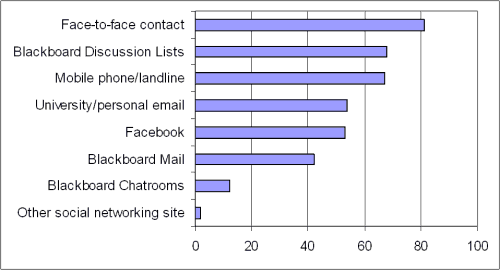
While there was general satisfaction with the wiki-based assessment, the students did raise a number of issues which are worth recording. There were some concerns about the group work aspect of the assessment such as free riding and the way in which marks were allocated however these were not specific to the wiki. One more specific concern was the investment that the students had to make in learning the Confluence wiki platform. Most students found that they had to spend some time learning how to use it before they were in a position to create and edit material on the wiki. One student argued that “I am doing an economics degree, therefore shouldn’t expect to be graded on my use of computer skills” while others opined that groups with highly computer or IT-literate members were at an advantage. Many students also felt that the wiki-based assessment involved a larger time input than its contribution to their overall assessment warranted. Fully three quarters of the students thought that they had put either a lot more or a bit more time on the wiki-based assessment compared to coursework on their other modules. These comments will inform the instructor’s approach to this kind of assessment in the future.
Discussion and Conclusions
The key message from this project was that wikis can be successfully used to facilitate and co-ordinate assessed group work in standard university modules and that, in the process, better feedback can be given to students and higher student satisfaction scores achieved. Given the growing penetration of wikis and other types of Web 2.0 technology into different aspects of business and social life, students will increasingly expect to be exposed to these skills at university and the project showed that the use of these skills can be integrated with the rigorous academic study that students also expect from leading British universities.
The project did, however, raise some interesting issues about whether both the technology and the students are fully prepared for the wiki revolution that authors like Tapscott and Williams predict. On the technology front, students did find that mastering the wiki package required the investment of time and effort before they were able to use it effectively and instructors need to choose a wiki platform carefully. One further issue seriously limits the applicability of wikis in economics modules. This relates to use of equations and mathematical notation which are not handled very well either by virtual learnings environments or by wiki platforms. Many of the Labour Economics students did incorporate equations and maths in their work however this was not done in a truly dynamic or interactive way. Rather the equations had to be edited offline in other packages and then uploaded to the wiki.
Concerning the students, there is often a presumption that the young people arriving at universities today are “digital natives”, skilled in all forms of IT as they have been exposed to computers from an early age and at all stages of their previous education. The implication is that such students can be expected to be taken further quicker in terms of their ability to use new forms of IT skills. Observation of how the students actually worked on the wikis led the instructor to the view that many of the students were not embracing what, for want of a better expression, we might call the “wiki ideal”. The “wiki ideal” is the idea that the internet is genuinely the platform on which work is created and edited so that a wiki on a particular topic grows (organically) from possibly just some random notes by one individual, through a process of online refinement, editing and re-editing by numerous different participants with conflicting views and intepretations into a complete, comprehensive, stable, correct information resource on that topic. The instructor’s suspicion, confirmed by the results of the online survey, was that many students were engaging in two distinct types of non-ideal behaviour. First, the students were creating their work in standard packages like Microsoft Word, Excel or Powerpoint and uploading something reasonably complete to the wiki, rather than using the wiki as a workspace in which editing and refinement would take place. Second, it seemed that there was relatively little reading and editing of each other’s work: instead the students were dividing the topic into subsections and essentially writing a mini-essay each which was then tagged together with the work of others into a wiki section. To the extent that it was considered desirable, changes in the method of assessment of the wiki could be used to encourage “better” wiki behaviour.
Notwithstanding these comments, the evident success of using the wiki-based assessment, in what is otherwise a very standard third year economics module, should encourage other lecturers to consider this form of assessment. For the instructor, it was the most enjoyable teaching experience he has had in his twenty years of university teaching and revitalized his attitude to e-learning in particular and teaching more generally. Quite apart from anything else, the palpable enthusiasm and excitement of the students about using a new form of technology and being able to research a topic and create an online information resource fully vindicated the investment by the instructor and University in this new form of higher learning.
Acknowledgements
I would like to thank Peter Whitton and the Centre for Excellence in Enquiry-Based Learning (CEEBL) at the University of Manchester for their support with this project. My biggest debt, however, is to the students whose enthusiasm for the wikis made the project successful.
References
Cummings, R. (2010), What Was a Wiki, and Why Do I Care? A Short and Usable History of Wikis in Wiki Writing: Collaborative Learning in the College Classroom edited by Cummings, R and M. Barton, Ann Arbor: University of Michigan Press.
Gilbert, D., H. Chen and J. Sabol (2010), Building Learning Communities with Wikis in Wiki Writing: Collaborative Learning in the College Classroom edited by Cummings, R and M. Barton, Ann Arbor: University of Michigan Press.
Seely Brown, J. and R. Adler (2008), Minds on Fire: Open Education, the Long Tail, and Learning 2.0, Educause Review, 43(1), 16-32.
Tapscott, D. and A. Williams (2007), Wikinomics: How Mass Collaboration Changes Everything, Atlantic Books. ISBN 9780857895134
Tapscott, D. and A. Williams (2010), Innovating the 21st- Century University: It’s Time!, Educause Review, 45(1), 16-29.
↑ Top
